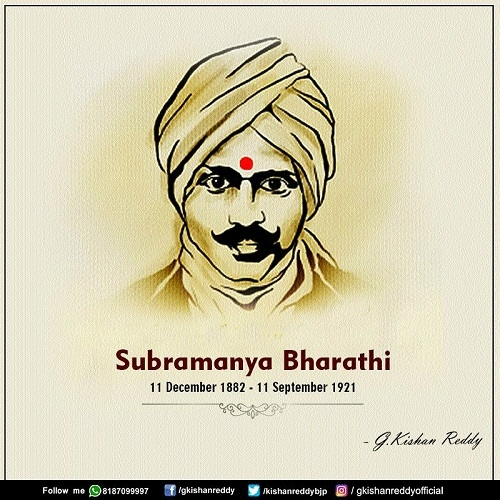Of the process of poetry
Date :06-Jun-2023

By Vijay Phanshikar
“He who writes poetry is not a poet. He whose poetry has become his life, and has made his life his poetry -- it is he who is a poet.
- The legendary Tamil poet
Subramanya Bharathi.
Prose
THIS is an altogether different dimension to poetry and its creator -- the poet. This rather curt definition expresses the relationship Subramanya Bharathi had with what he created all his life -- poetry. Poetry, for Subramanya Bharathi, is not just a word-play with twisted syntax, so to say. Poetry is life, and life is poetry, he felt. In other words, poetry is not something that stems only from the lips; it is something that stems from the heart. In still other words, poetry is something that is available everywhere in life -- in all its twists and turns and hairpin bends and rising and falling ground, in all the people one comes across, in all the situation that one sees or senses. Poetry, thus, is all-pervading, so to say.
Of course, this approach is not easy to grasp for the ordinary mortals. One has to rise above poetry in mere words. One has to go beyond words, duck behind words, look for unstated meaning, search for unexpressed nuances -- not just in poems but also in life’s realities. For one, Subramanya Bharathi believed deeply in the omnipotence and omnipresence of poetry as the potion of life. This is understandable to anybody if he or she tries to take a pause about the possible meaning of poetry. One does arrive at a better understanding of the poetic process when one tries to go beyond mere words.
In Subramanya Bharathi’s understanding, there is poetry everywhere, and the poet’s task is to bring it up in words. This is very much like the statement of an un-named sculptor that the idol is always hidden in a raw stone, and the sculptor’s real task is to slash out the unwanted stone and bring out the idol or the statue. No matter the words they may use to describe the process of their poetry, almost all poets realise the existence of poetry in every moment of life, every turn of events, every twist of the path; Likewise, every person one meets has some poetry hidden and waiting to express itself.
That says it all. For, poetry is not words. Poem is words. Poetry is life in those words, the meaning the words assume in different hands, different minds. To further the thought, one must say that poetry is also not only imagination. It is much more, much deeper, much higher. Poetry, in other words, is sensing things sensitively, sensibly. Can we, then, call poetry a spiritual process? Of course, we can, and we must. For, poetry is sensed and lived in spirit. And when it sinks that deep, or rises that high, then poetry becomes the omkaara that stems from the unfathomable depth of being. Of course, such poetry is created only rarely. That is the reason why only some poetry is remembered forever by the succeeding generations of humans, while most poems are lost from memory. The poetry lived in spirit is created in spirit and stored, too, permanently in spirit. And the person who creates such a poetry is a poet, going by the definition of Subramanya Bharathi. Still, the poetic process does not get explained fully. It requires a deeper contemplation. But then, it is wise to leave that to every person in whose consideration poetry enters. For, poetry is a deeply personal experience -- whether as a poet or as a connoisseur.